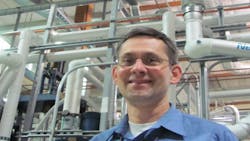Fuel cell technology will help refrigerated trucks keep their cool
Grocery merchants in Texas, California, and New York will soon have ice cream, frozen foods, and fresh produce delivered by tractor trailers with refrigeration units powered by fuel cells.
The fuel cells will do the work normally done by a small diesel engine, which keeps the cargo at the proper temperature while the trucks are making deliveries. Each of the four trucks will still be equipped with a main diesel engine that actually powers the truck.
Researchers at the US Department of Energy’s Pacific Northwest National Laboratory, which is overseeing the project, believe this will be the first time that refrigerated trucks making deliveries have been equipped with a fuel cell. The device creates electricity by driving chemical reactions using hydrogen and air. The only byproducts are heat and water.
“This is a great application for a fuel cell,” said Kriston Brooks, the PNNL researcher leading the project. “A trailer refrigeration unit traditionally is powered by a small diesel engine or electric motor that drives compressors to provide cooling to the cargo. A fuel cell can potentially provide a clean, quiet, and efficient alternative by powering the electric motor.”
Two leading fuel cell manufacturers, Massachusetts-based Nuvera and Albany NY-based Plug Power Inc, will each receive $650,000 from DOE’s Office of Energy Efficiency and Renewable Energy. The companies will provide matching funds and labor of their own. A PNNL team led by Brooks will oversee and evaluate the two-year program.
Industry officials estimate that about 300,000 refrigerated trucks with auxiliary power units are on the road in the United States. By replacing the small diesel engines with the more efficient fuel cell, users will see fuel savings of approximately 10 gallons a day per unit, in addition to reduced emission of pollutants and significantly quieter operation.
“Accelerated fuel cell use in this application is also expected to create jobs in the energy sector, increase fuel cell manufacturing volume, decrease costs, and catalyze a stronger domestic supplier base,” said Jamie Holladay, PNNL’s sector manager for fuel cell technologies.
Fuel cells are becoming more common as energy sources in buildings and in vehicles such as buses. While the devices are generally more expensive than traditional forms of energy generation, many scientists and product developers expect that as they become more widely adopted and production levels increase, their cost will come down.
In one project, Nuvera will work with Thermo King to develop the refrigeration unit to keep the truck cool using Nuvera’s Orion fuel cell stack. That truck will make deliveries for a Sysco Corp food distribution facility in Riverside CA and for a San Antonio TX food distribution center for the H-E-B grocery store chain.
In the other project, Plug Power will work with Carrier Transicold and Air Products to equip trucks making deliveries for a Sysco food distribution facility on Long Island NY. The trucks will be equipped with Plug Power’s GenDrive fuel cell product.
Both the Sysco and the H-E-B facilities already use forklifts powered by hydrogen fuel cells, part of a trend fostered by DOE to increase the use of the technology in industry. At both companies, the infrastructure to provide hydrogen for the fuel cells is already in place; the hydrogen is generated on site from natural gas and water using Nuvera’s PowerTap hydrogen generator and refueling system. For the site using the Plug Power technology, the hydrogen will be supplied by Air Products using an outdoor hydrogen dispenser.
Each fuel-cell powered refrigerated trailer will run for at least 400 hours at each demonstration site, delivering goods from the distribution centers to stores or other outlets.

